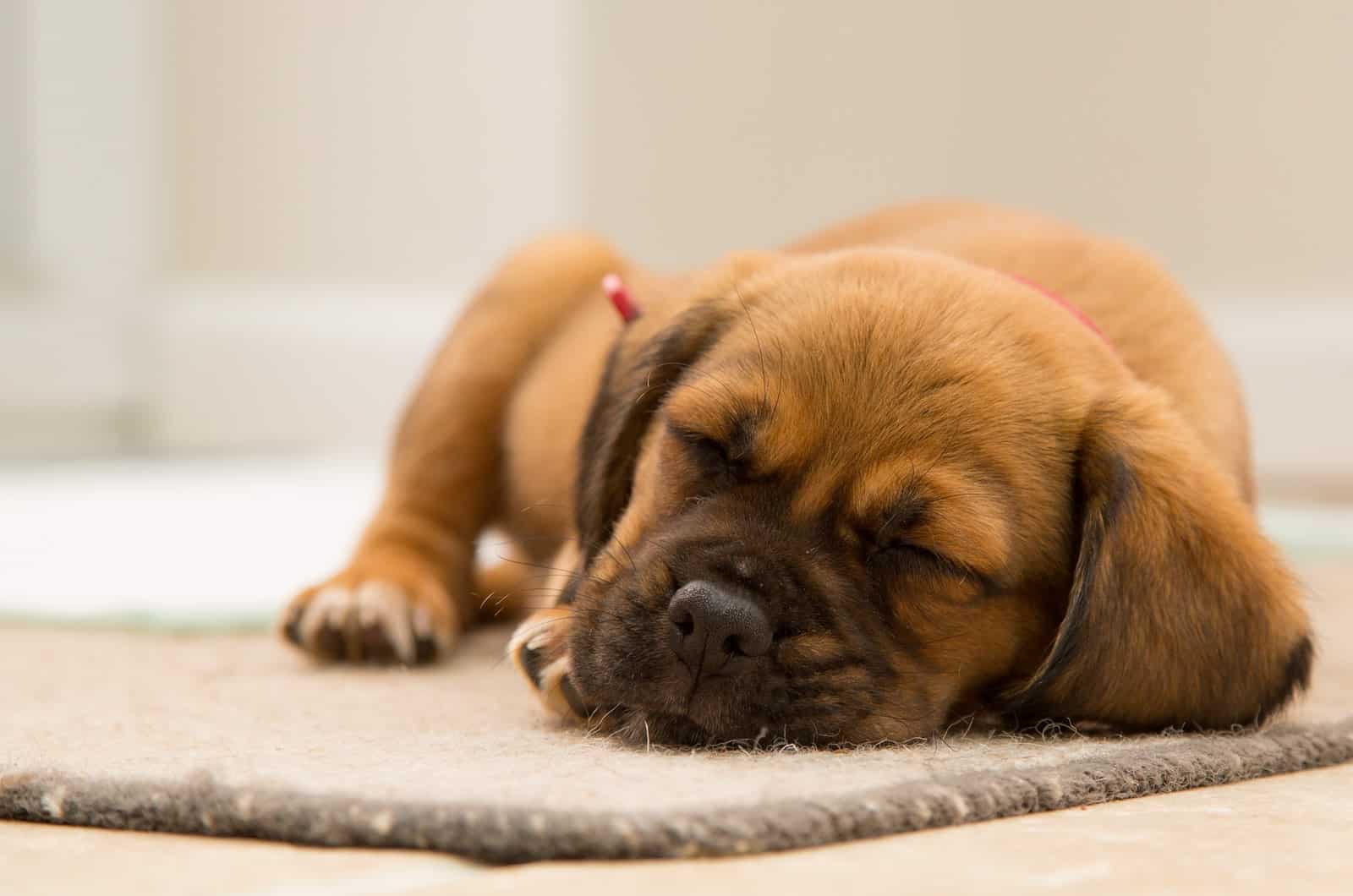Puppy snoring can be one of the cutest things about your new dog – or it can be one of the most annoying. Fortunately, most of the time, it is pretty normal. Just like humans, puppies and adult dogs can snore during sleep.
However, sometimes, puppy snoring can be a sign of a serious health issue. As such, it’s something that you should keep an eye on. This is especially the case if you have a puppy snoring while awake or if the snoring has appeared suddenly.
We’ll explain the causes of puppy snoring and let you know whether this is something you should be worrying about. Also, we’ll give you several tips on how to prevent snoring in dogs and when it’s time to visit a vet.
Here’s what you need to know:
Do Puppies Snore?
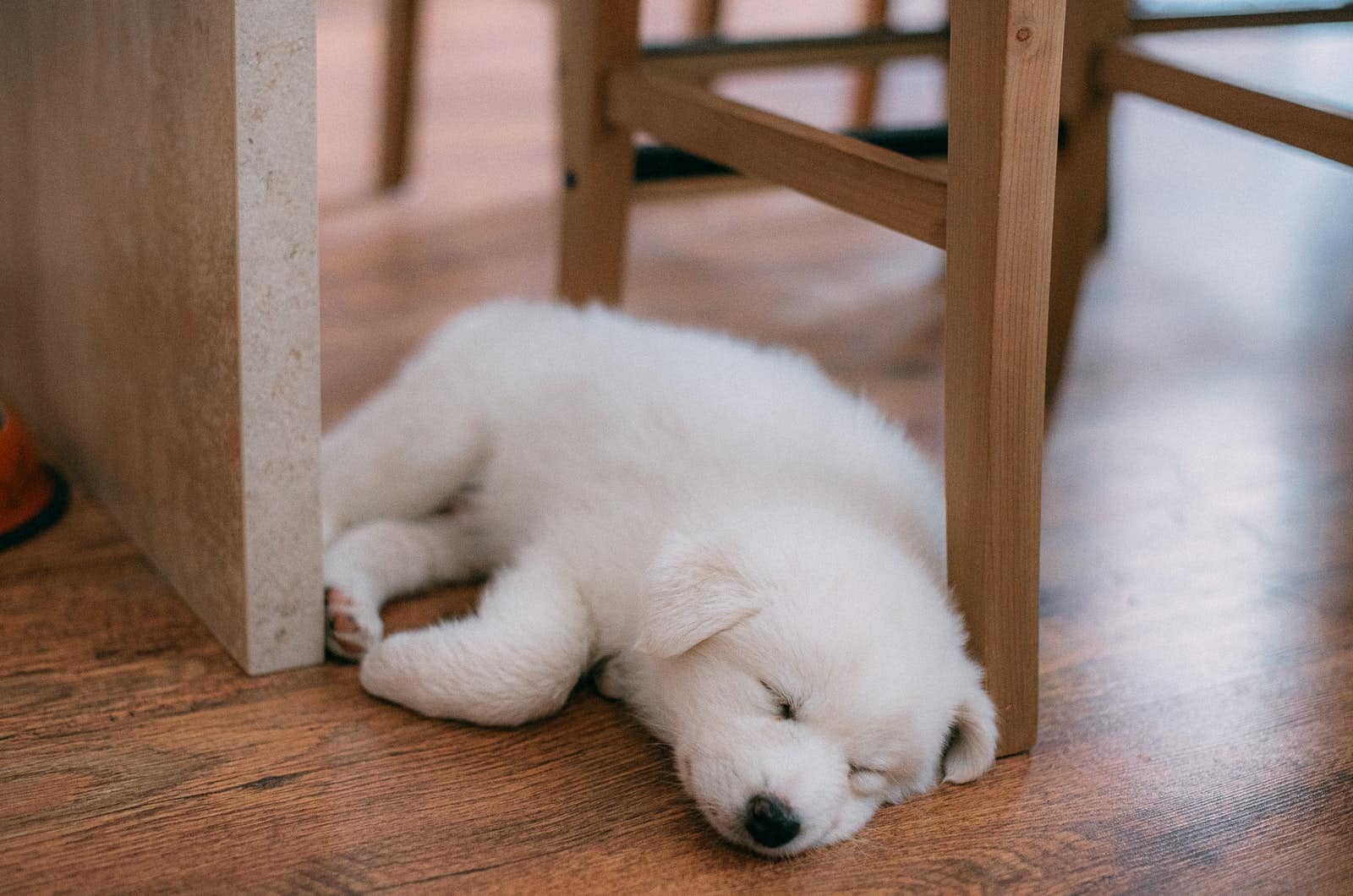
Puppies snore in pretty much the same way humans do. There is a restriction in air flow, causing the snoring sound we all hear.
When the obstruction is in the nasal passageways or nostrils, they will vibrate as the air passes. This will create that (not so) quiet, familiar sound.
Snoring is more common in puppies, although adult dogs can snore too. Depending on the breed, snoring might be more present in senior dogs than in puppies.
Is Puppy Snoring Normal?
Most of the time, snoring is perfectly fine and harmless. The biggest issue is whether their human owners will be okay with hearing the snoring sound throughout the night – especially if you two share a bedroom!
However, sometimes snoring can be a sign that something’s wrong. To understand whether that is the case or if your dog is just a loud sleeper, you have to understand the causes of snoring and how to recognize them.
Why Do Dogs Snore?
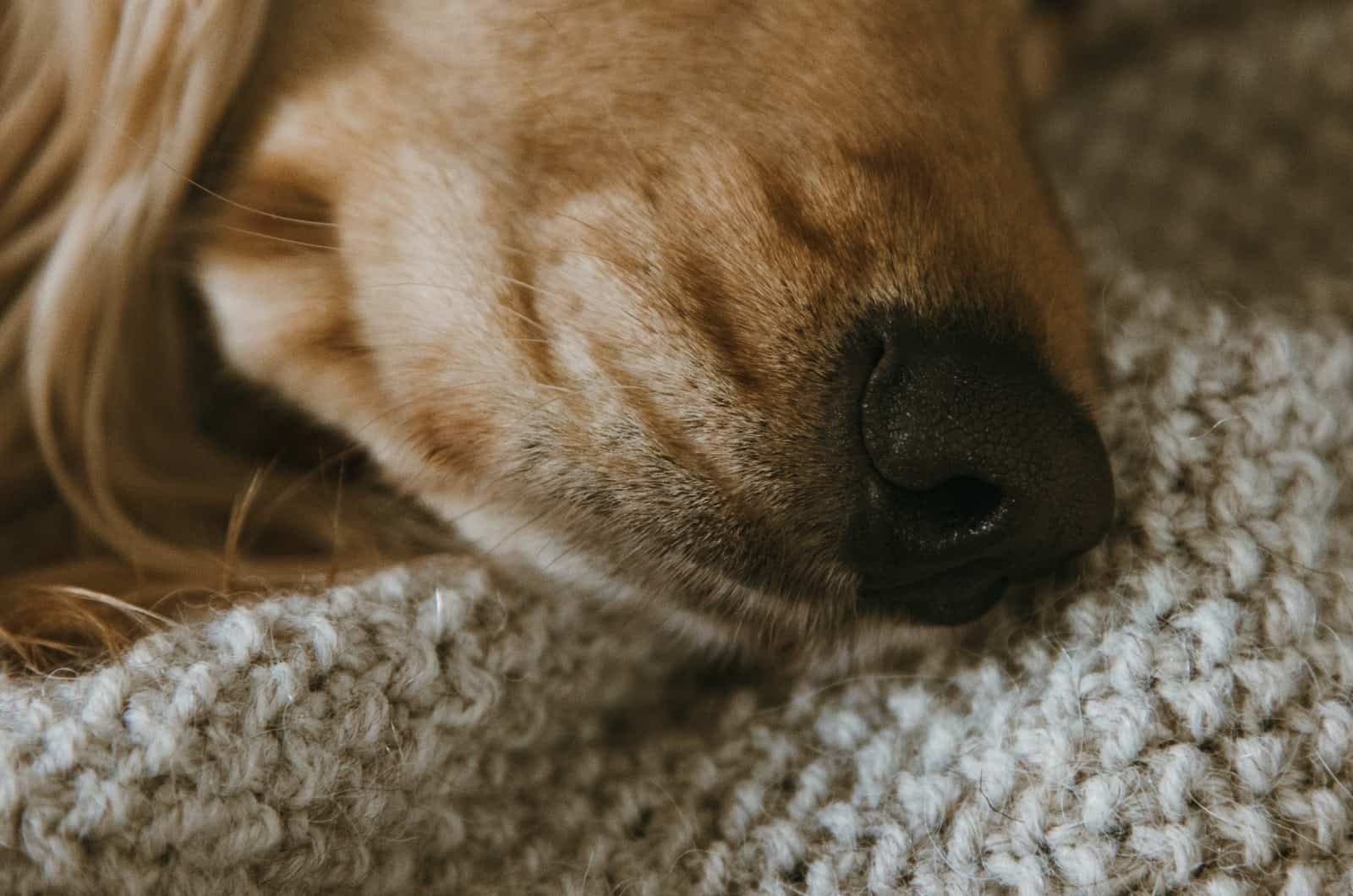
There are many reasons dogs snore, but we’ve already covered the direct cause of it: There is a restriction in air flow, causing the soft tissue in the dog’s throat and mouth to vibrate.
Most of the time, the explanation is clear enough. For example, if your puppy loves to sleep on his back, his tongue might be blocking his airway. This will cause snoring.
However, there are many other causes of snoring in dogs, and some aren’t as easy to understand.
Here are several reasons your puppy might be snoring:
Narrow Airways
A healthy dog’s throat’s interior has been designed to ensure that oxygenated air gets into your dog’s body. If there is too much tissue surrounding it – or if that tissue is too floppy – it may cause the narrowing of the airways inside the throat.
You might have noticed that puppy snoring is fairly common in breeds that have short snouts. This is because there isn’t enough room in the dog’s neck and mouth for the necessary soft tissue. This will cause narrow airways.
The biggest example of this is brachycephalic dogs, as these pups are the most prone to breathing issues, including snoring.
Brachycephalic dogs, also known as flat-faced dogs, have short noses but normal-sized soft palates located at the back of their throats. In fact, due to the size discrepancy, the soft palates might even appear enlarged. As such, brachycephalic dogs have very short breathing passages.
Pugs, Pekingese, Boston Terriers, Cavalier King Charles Spaniels, Chow Chows, Cane Corsos, Boxers, and Pugs are some of the most popular brachycephalic dog breeds.
This is often followed by what the vets call everted laryngeal saccules. Their soft tissue is pulled back into the airway, blocking the airflow.
This results in loud snoring that can sometimes be heard even when dogs are awake.
Not just that, but many brachycephalic breeds also have entirely or partially blocked nostrils. Their nostrils will look like a crescent instead of being a fully opened tunnel. This is known as nasal stenosis, and it’s a genetic condition that can result in obstructed nasal passages, restricting breathing. Stenosis can restrict the airflow even further.
Another problem brachycephalic dogs face due to narrow airways is short turbinates.
Turbinates are tiny bone ‘shelves’ located in the nasal cavity. They create a large surface area and serve many different functions, such as protecting lungs from cold and dry air, serving as a filter for pathogens including dust, viruses, and bacteria, and providing a large surface area for smell sensors, which are very important for dogs.
However, brachycephalic dogs have shortened skulls. As such, the turbinates are shortened, and sometimes even grow backward into the nasopharynx. This can lead to blockage or narrowing of the airways.
Obstruction
Even dogs that aren’t brachycephalic can snore, and this usually happens because of some physical obstruction that has caused a temporary blockage.
Sometimes, dogs can end up having a foreign body up their noses. Usually, these are grass seeds or plant material your pup has breathed in during a walk. They can block the nasal passage and cause snoring.
These can also cause sneezing, and your pup might be rubbing his nose due to discomfort. Nasal discharge is also possible, as this is the dog’s body’s way of trying to eject a foreign object.
Usually, having a foreign object inside your dog’s nose has to end with a visit to a veterinarian. Only a professional would know how to get the object out.
Infection
Upper airway respiratory infections are another cause of puppy snoring. For example, your pup might have kennel cough. This is a type of canine flu that can easily spread between dogs at shelters or from the same litter.
Kennel cough can cause mucus in the dog’s snout, triggering temporary puppy snoring that will clear once the pup is healthy again.
Keep in mind that a runny nose can be caused by several other infections, such as conjunctivitis, bronchitis, or even a more serious health condition. As such, you should never ignore it. If it lasts for longer than a few days, if it gets worse, or if you notice some other concerning symptoms, take your puppy to the vet.
Dogs aren’t as prone to common colds like humans are. In fact, colds are very rare in canines. To be on the safe side, always make sure you’ve taken your pup to the vet in time.
Allergies
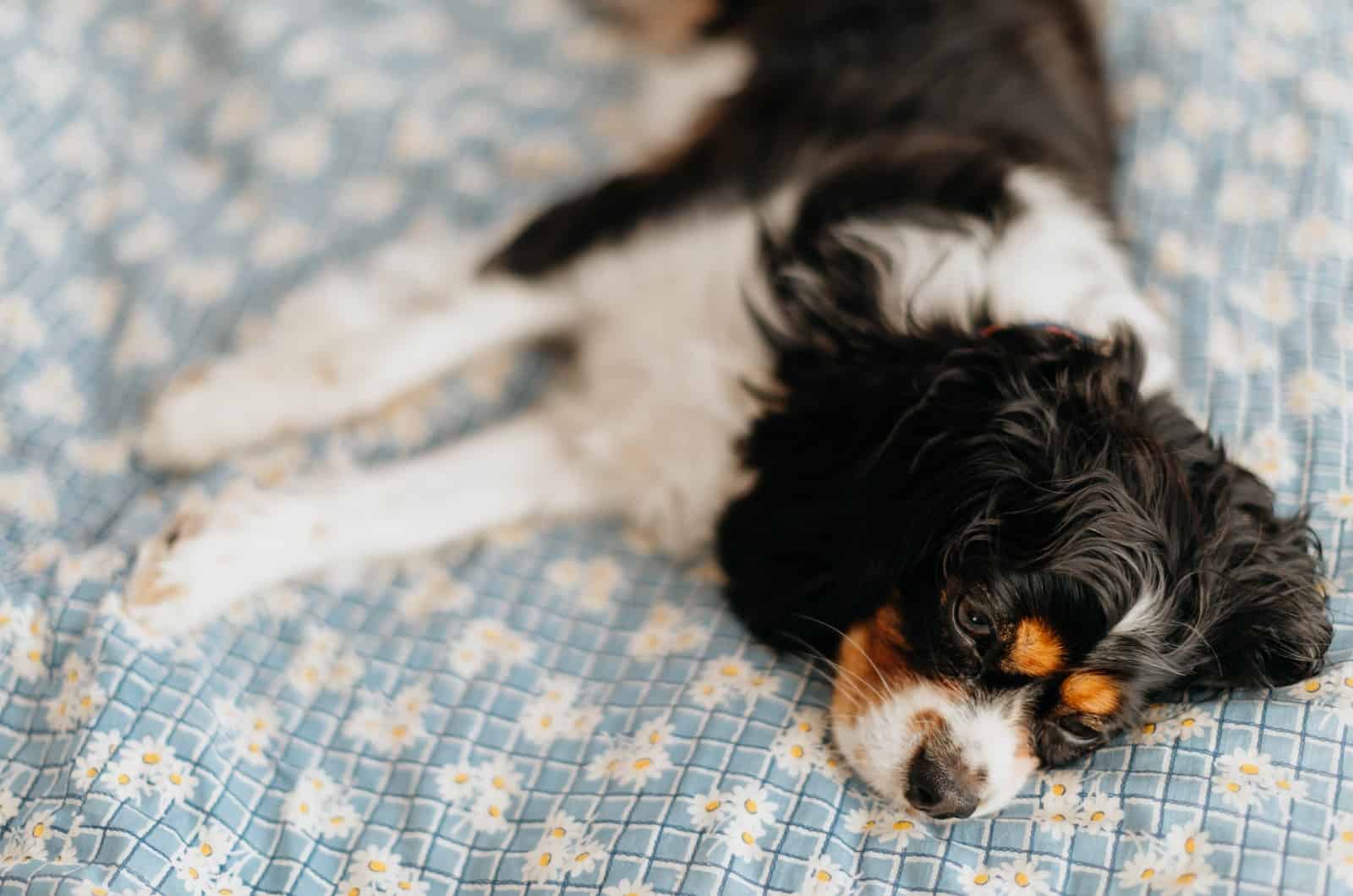
Dogs can suffer from various allergies, just like humans. Allergies may affect airways, causing swelling of the tissue inside the dog’s throat and mouth. This will result in snoring.
Usually, snoring from allergies is accompanied by a clear and watery nasal discharge. This is the main indicator that your pup has allergies and not a respiratory infection.
However, if your puppy has never had allergies before, you should take him to the vet for a check-up. Allergy symptoms are very similar to the symptoms of other health problems, and you want to stay on the safe side.
If the snoring is definitely caused by allergies, your vet might prescribe medication like antihistamines. These can help reduce the symptoms of an allergic reaction, including snoring.
The most common cause of puppy snoring due to allergies is secondhand smoke. If you’re a smoker, there is a higher chance your puppy will snore.
This is because canine lungs are quite similar to humans, and they are sensitive to the same irritants and chemicals. Smoke is a common allergen that can make them sick, causing snoring when the dog sleeps.
Medications
Certain medications can also cause puppy snoring. This is because restricted airways and respiratory system problems are a side effect of many drugs, including pain relievers. They make the throat relaxed, triggering puppy snoring.
If you notice your dog has started snoring recently, and the only thing that’s changed in his lifestyle is a new medication, consult your vet and see whether the medicine is to blame.
Unfortunately, if the medication is necessary for your puppy’s well-being, you might have to deal with the snoring. While the vet might be able to recommend something that can help with the snoring, sometimes the only solution is to learn to live with it.
Obesity
Problems with weight are likely the most common cause of puppy snoring. Your dog doesn’t necessarily have to be morbidly obese for snoring to occur. Even being a little overweight can trigger this.
When a dog gains weight, one of the locations where excess fat will be deposited is around the throat. This can restrict the airflow, causing snoring.
The best way to find out whether your snoring dog is obese is to try to feel his ribs. If you cannot feel them, then he is overweight, which is likely what’s causing the snoring.
Most of the time, you can stop puppy snoring if you simply reduce his weight by a few pounds. Don’t give in to the pleading puppy eyes, and don’t feed him treats. Forget about giving your dog human food! It is never good for the dog’s weight and overall health.
By helping your overweight dog lose weight, you’ll not only help reduce snoring, but you can prevent many different health conditions. This is likely the best thing you can do for your pet.
Tumors And Nasal Polyps
Finally, snoring can be caused by a few other health conditions, such as nasal polyps. These are small pink growths that occur in the nose. If they grow large enough, they’ll obstruct the airflow, causing your puppy to snore.
These polyps can also cause nose bleeds, which can be terrifying for dog owners. Because of this, they should always be checked by the vet.
Not just that, but nasal polyps can be a sign of various tumors. If you take your dog to the vet, they might notice if your pup has a serious health condition in time to treat it. Catching a tumor early is the best way of removing it and ensuring your pup stays healthy.
Some breeds, such as German Shepherds, are especially prone to nasal tumors. These can be treated with radiotherapy or surgery, and you should always aim to get rid of them before they become malignant.
Can A Dog Snore For No Reason?
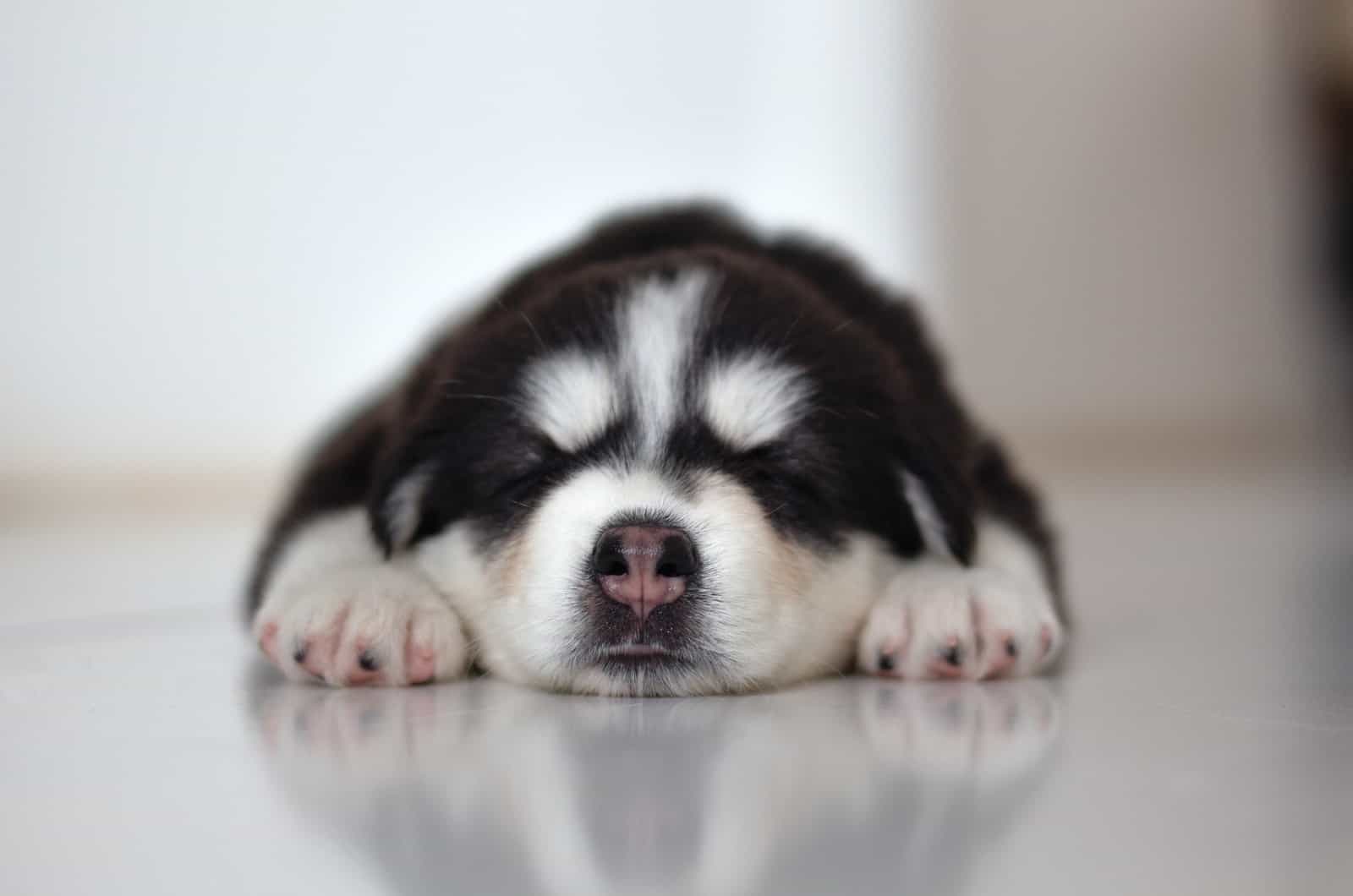
Certain dogs will snore even when there is apparently no reason behind it. They can be very slim and healthy, but the snoring will still be present.
Just like humans, some dogs will simply snore even when there isn’t a clear cause behind it. This shouldn’t concern you – it’s just something they do.
Snoring can also happen due to low humidity or certain sleeping positions. If your dog sleeps on his back, he’ll likely snore. Also, try getting a good humidifier, especially if you also have a snoring problem. Dry air can cause snoring.
Certain dogs have health conditions that are challenging to diagnose, such as sleep apnea, another common cause of snoring.
While snoring shouldn’t concern you, remember to mention to your vet that your dog is a snorer during the next visit. They might want you to do some other tests.
Pitbull Puppy Snoring
Pitbulls are one of the dog breeds that are very prone to snoring. There are several reasons behind this.
First of all, Pitbulls have a short snout, making their airways short and narrow. Their nostrils are somewhat narrow, causing loud breathing and snoring.
Pitties are prone to allergies, so if you’re a smoker, if it’s pollen season, or if you live near a busy street, this might be the cause of his snoring issues.
Also, Pitbulls can easily become overweight, especially if they don’t get as much exercise as they should. They were bred to be active dogs, and if they’re kept indoors without enough walks, they will gain weight easily.
Labrador Puppy Snoring
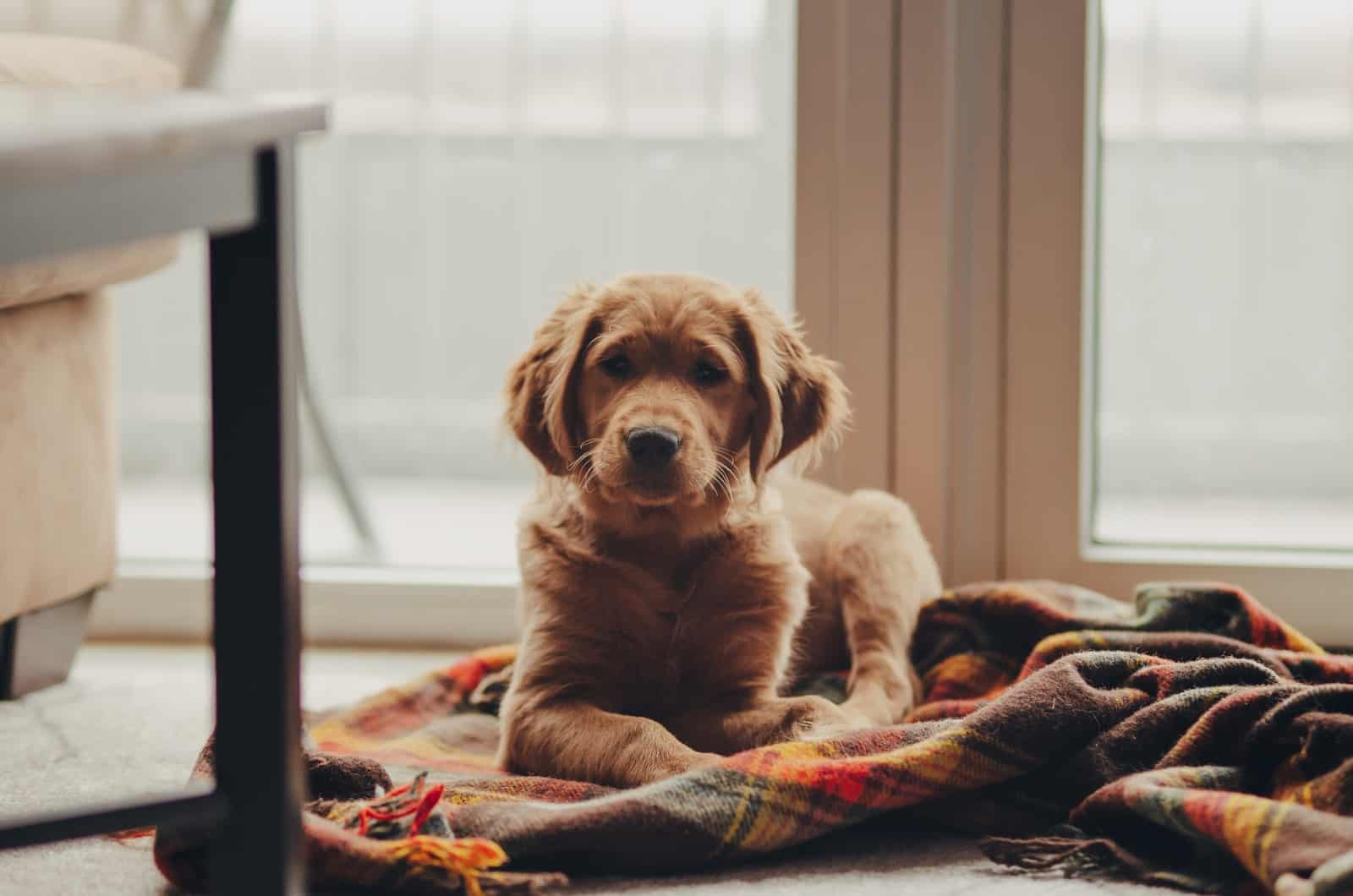
If your Labrador Retriever is snoring, the most common reason behind this is obesity. Labs love to eat, and they can be quite lazy if kept as indoor dogs.
Fortunately, they have rather healthy respiratory systems, and they aren’t prone to allergies and infections. As such, they’ll rarely suffer from serious health conditions that can cause snoring.
Golden Retriever Puppy Snoring
The reasons a Golden Retriever puppy might snore are quite similar to Labrador Retrievers snoring. These dogs are prone to obesity, and they can struggle with allergies.
Also, Golden Retrievers have long hair. Sometimes, they might breathe in the hair, which will block their nasal passage.
However, this rarely happens, as most of the time, dog hair isn’t thick enough to create an obstruction.
English Bulldog Puppy Snoring
English Bulldogs are brachycephalic dogs, and snoring is quite common. In fact, they are among the loudest snorers in the canine world!
Snoring is a breed characteristic of English Bulldogs. As such, it can never be entirely eliminated. These pups will produce all sorts of breathing sounds, such as loud breathing, snorting, wheezing, and snoring.
We would recommend that you don’t sleep in the same room as your English Bulldog puppy. Trust us – their snoring can keep you awake at night!
Shih Tzus Puppy Snoring
Yet another brachycephalic dog breed, Shih Tzus are known to snore. However, they will rarely snore as loud as English Bulldogs or Pugs.
Not only do they have a short muzzle, but they have a compressed upper jaw and a very compact skull. All of this leads to a very compressed upper respiratory system.
Also, they are severely prone to allergies, which will only worsen their amount of snoring and snorting.
Beagle Puppy Snoring
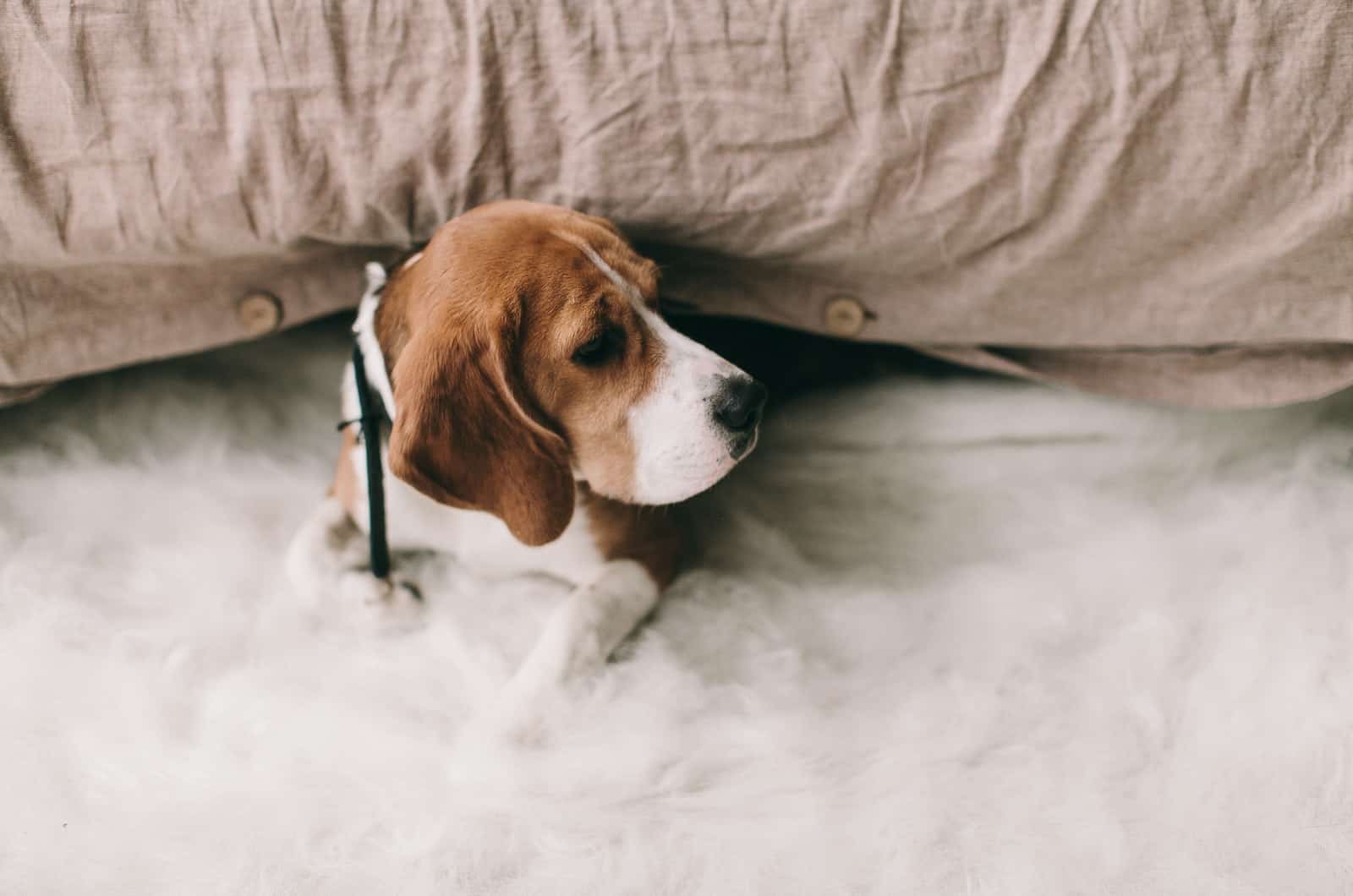
Beagles are far from being brachycephalic dogs. However, they tend to have an elongated soft palate. This tissue hangs at the back of the Beagle’s throat, sometimes blocking the breathing passage when the dog sleeps. When this happens, your dog will snore.
Beagles are also very sensitive to dry air. Consider getting a humidifier, as it can help reduce snoring.
Keep in mind that Beagles are another breed in which you can never entirely eliminate snoring. It’s a part of the breed characteristics, and you’ll have to learn how to live with it.
Bulldog Puppy Snoring
Bulldogs are big snorers and are known to keep the entire household awake during the night. They have small skulls and short muzzles, and both increase the likeliness of these pups snoring.
In fact, Bulldogs will produce all sorts of loud sounds, and they’ll even drool while making them! If you’re a light sleeper, you might not be able to share a bedroom with these dogs.
French Bulldog Puppy Snoring
Frenchies are brachycephalic dogs that are prone to snoring. In fact, snoring is a part of their genetics, and they’ll snore very loudly – although they are cute enough for us to forgive them for keeping us awake.
They are prone to brachycephalic airway syndrome, and this is another big reason behind French Bulldog puppy snoring.
At the same time, they struggle with various allergies, so we would not advise smoking in the same room your pup loves to spend time in.
Pug Puppy Snoring
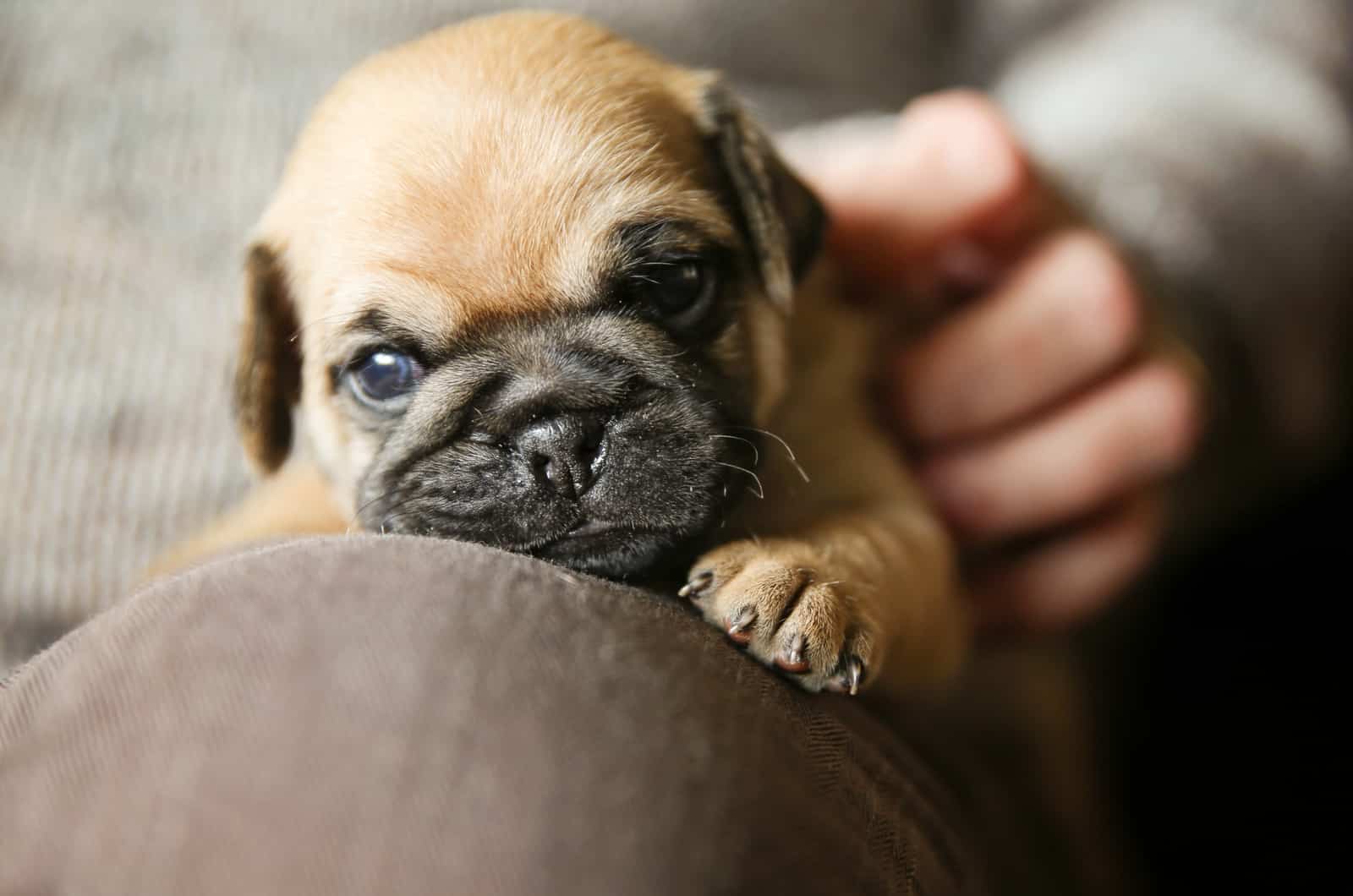
Small Pugs might easily be the loudest snorers out there. They snore so loud you might think that there’s another human sleeping in the same room!
In fact, as they have extremely short snouts, it isn’t uncommon for Pugs to snore even while awake! They will often breathe heavily, wheeze, snort, and produce all sorts of unpleasant sounds.
Not just that, but their soft palate will commonly relax during sleep. This is another reason behind their loud snores.
At the same time, they are very prone to all sorts of allergies, which can only expand their breathing problems.
Rottweiler Puppy Snoring
Rottweilers aren’t brachycephalic dogs. However, they will still snore – and they can snore loudly. This is because they have a rather short face, making their airways short as well.
Fortunately, their snoring won’t get as bad as in Pugs or Bulldogs, despite their large size.
How To Stop A Dog Snoring
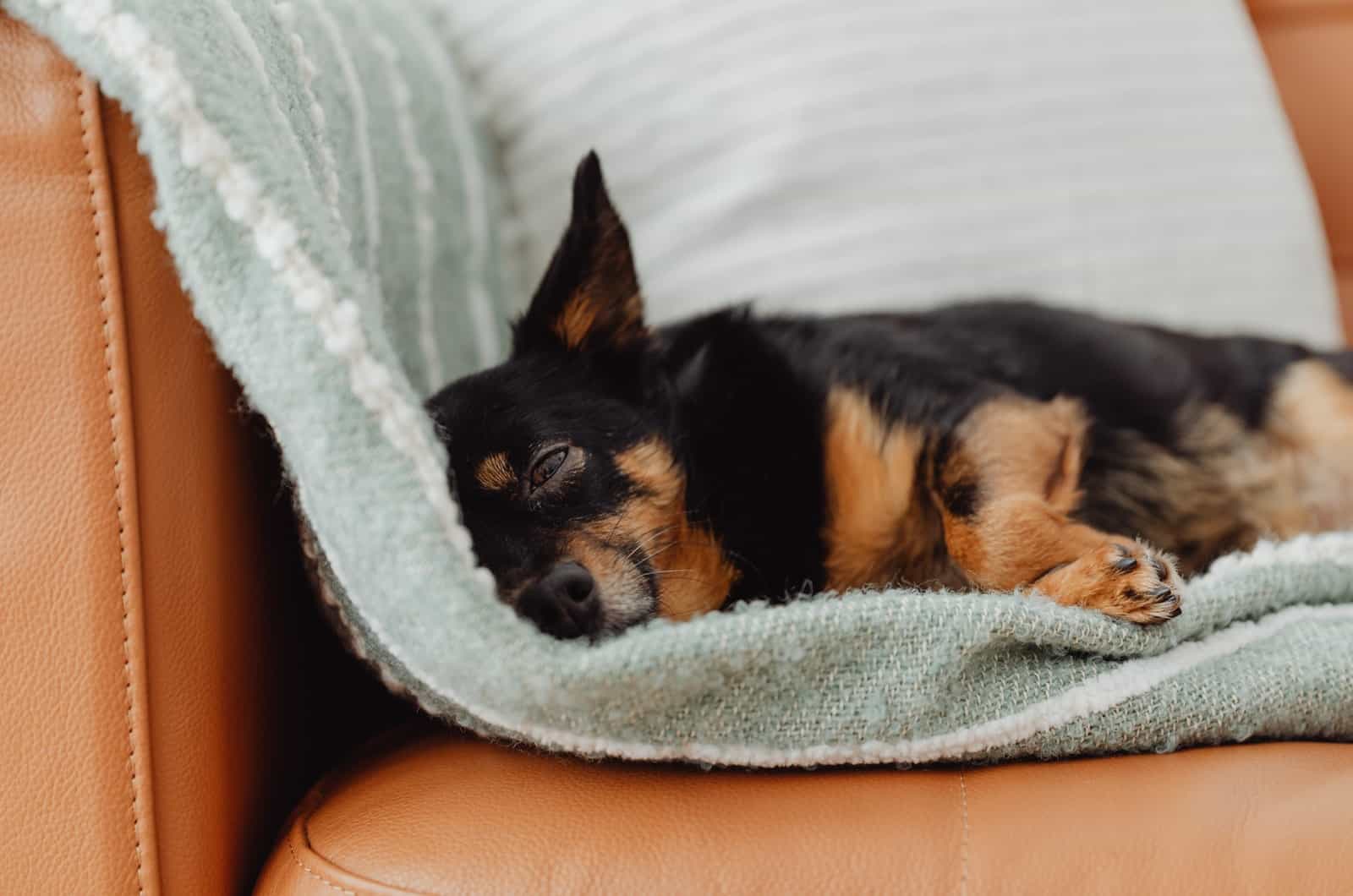
If you have a puppy snoring, you might want to stop this behavior. While there is no guarantee of success, there are a few things you might want to try, as they can make a difference.
Here’s what these methods are:
Reduce Your Dog’s Weight
Of course, if your puppy is already slim, this is something you should skip. Otherwise, it might not be a bad idea to help your dog shed a few pounds – especially as most family dogs have a bit of extra fat they don’t really need.
Reducing a dog’s weight won’t just help you and your dog sleep soundly at night – it can help your puppy live longer. Losing weight will also help them be more active and feel better overall. It’s a win-win situation no matter how you look at it!
Don’t Smoke Indoors
If you’re a smoker, you should be aware that smoking can cause serious health problems to your dog’s lungs, and it can cause puppy snoring.
If you don’t want to give up smoking any time soon – that’s your choice, but you might want to try to smoke outdoors so the smoke doesn’t contaminate the air indoors.
Try doing this for a week or two at first to see whether it’ll make any difference to your dog. If your puppy’s snoring is reduced – you’ll know that this was what’s causing the snoring in the first place.
Even if your puppy was snoring because of some other reason, smoking outdoors is still good for your dog’s health. Canines can get cancer from passive smoking, and this is a common cause of death in many dogs owned by smokers.
Change Your Puppy’s Sleeping Position
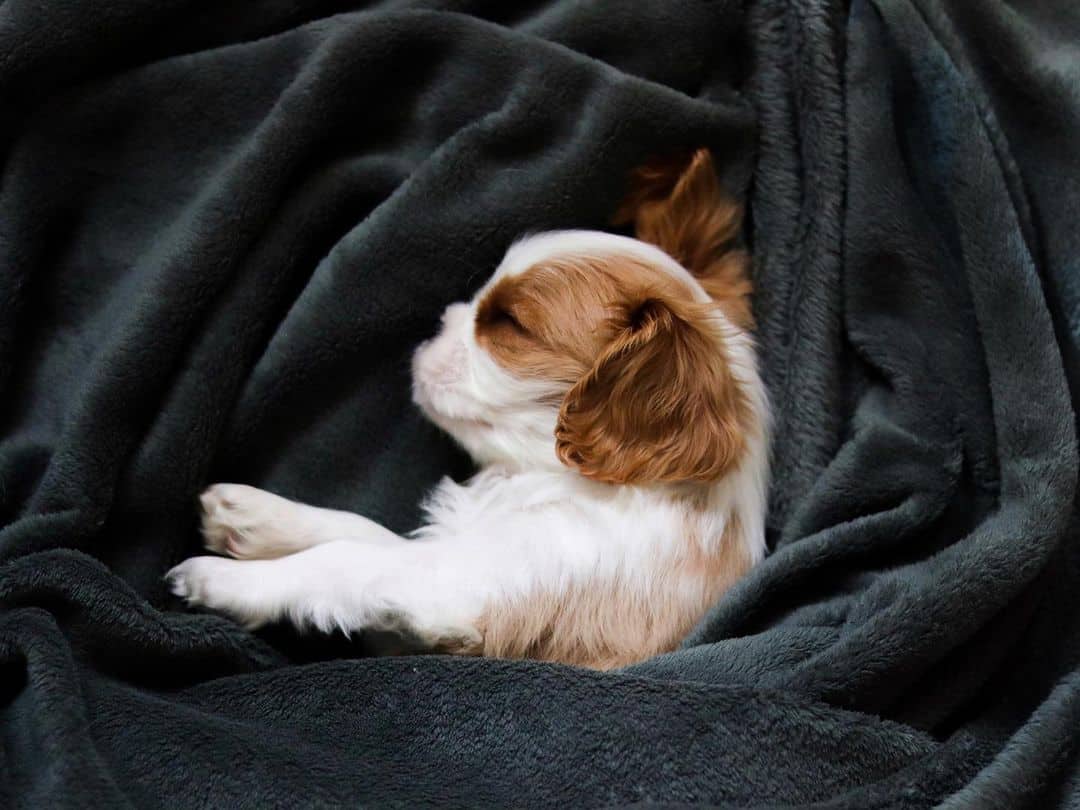
Photo from: @itsdaisythecavalier
If the snoring is caused by your dog’s weird sleeping positions, try making him adjust how he sleeps. For example, dogs that sprawl out on their backs are more likely to snore! Try to encourage them to sleep curled up, as this is a position they’re least likely to snore.
The best way to do this is to change your dog’s bed. For example, round or oval beds can make dogs want to be tucked in, and they cannot do so if they sleep on their backs.
A bed with a raised edge is also a good idea, as it’ll make your dog rest his head in a somewhat raised position.
Give Him Some Allergy Relief
If your puppy is suffering from allergies, there are certain things you can do to help him get relief and stop him from snoring.
Clean his bed as often as possible to prevent dust. Wait until there is less traffic outside before you take him for a walk. Also, don’t walk him as much when it’s pollen season.
Talk to your vet about getting some allergy medication that can give them relief and clear their airways. Not only will this stop snoring, but it will also help their health.
Can Puppy Snoring Cause Health Issues?
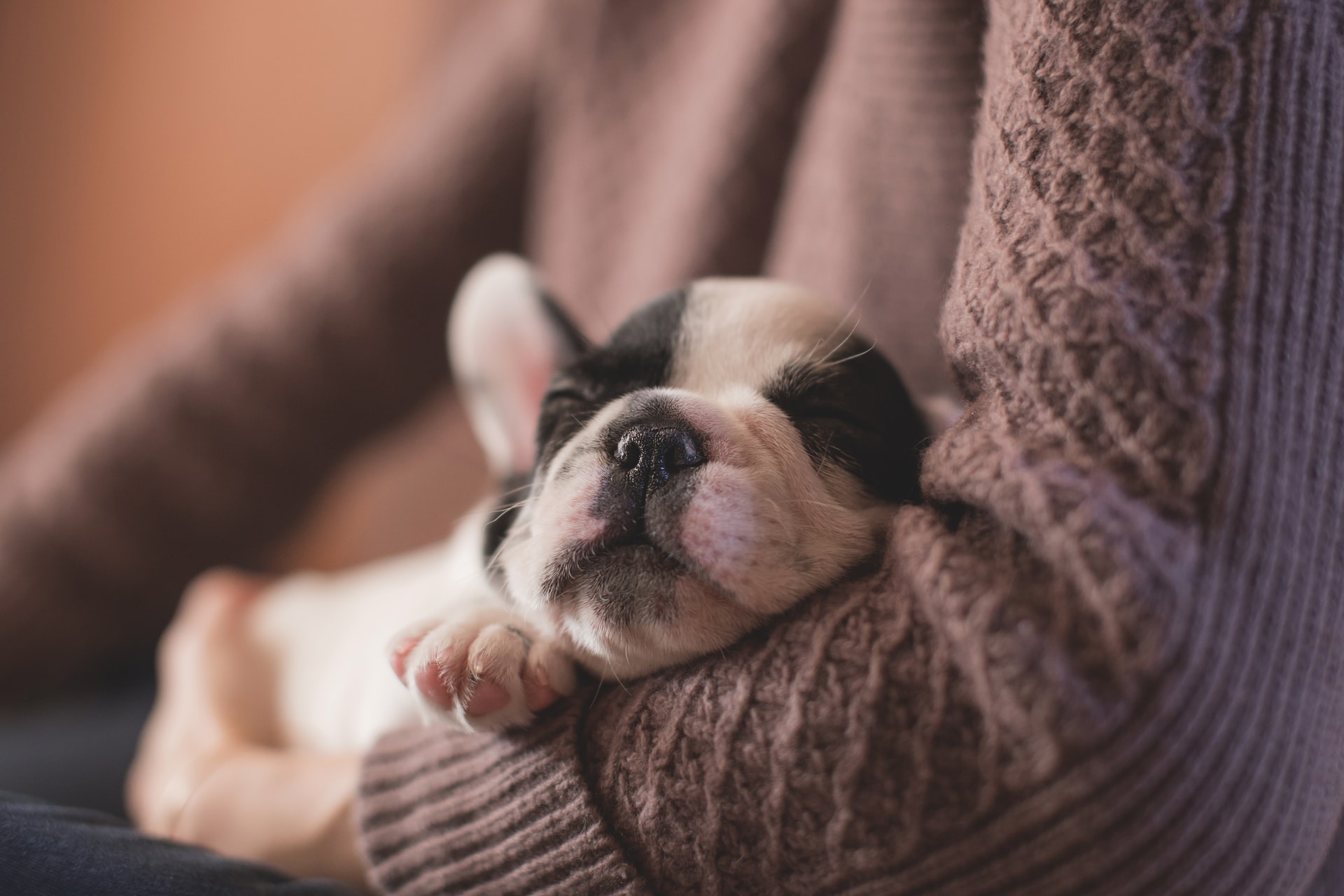
We’ve talked about health problems that cause puppy snoring – but can snoring cause health issues?
In people, snoring can lead to serious health problems. While there isn’t definite proof yet, there are some indications that the same can happen with many animals, including dogs.
For example, sleep apnea, which is associated with snoring, can cause high blood pressure in dogs.
However, there still hasn’t been enough research to prove that snoring is dangerous for dogs. Sleep apnea is a rare condition, and it’s unlikely that a puppy can be harmed by snoring.
Still, it is a good idea to get your puppy checked by the vet, especially if snoring is something new for them. It’s always better to be safe than sorry.
Read Next:
• 8 Week Old Puppy Breathing Fast While Sleeping: 10 Causes
• Help! My Dog Sounds Congested, What Should I Do?
